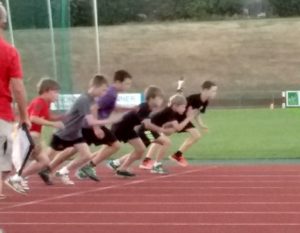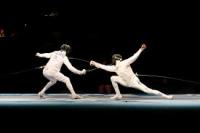Main Menu
Latest Blog Entry
User login
Power, acceleration and force: GAIN review 5
“Some research can’t interpret it’s own data, sometimes that data is wrong.”
Jack Blatherwick opened my eyes with 2 great lectures. The first was on Acceleration, the second on research. He had some great visual slides, that just explained things very clearly. There was a constant sound of “oh, I see….” From around the room as people began to grasp hitherto poorly understood subjects.
Not sure I can do it justice…
Power…or acceleration?
“Acceleration: more specifically, horizontal acceleration of body weight. The simplest and most accurate description from physics for explosiveness; quickness, agility and even speed. The words “power” and “force” can be misleading- not always, of course. Be a little suspicious. Trust your gut reaction.” This was the start of the physics lecture.
Does research that indicate heavier loads are necessary to generate power actually measure force instead?
Most of you will know that
Force = Mass x Acceleration.
F=ma
But have a look at this continuum with the same amount of force being produced.
F= Ma ———————————————- F=mA
Powerlifting Olympic weight lifting Sprinting
Body building Sprinting with
equipment
Studies that show Olympic weightlifting produces high force, but they may forget to say that the centre of gravity does not move fast. The object is to get the bar to move fast.
Conversely, using faster movements with out external load (extra mass) does create force too. If:
Power = Force x velocity
then
P= (ma)v
In 100 metre running, greatest Power occurs 2-4 seconds into the run, due to the Velocity being greater. The greatest acceleration occurs at the beginning of the run.
Which, if you rearrange the equation you come up with: A = F/m Right?
“Acceleration is more about how you apply the force, rather than how much force you can apply.”
So, linked into the work from Bosch and Winckler, Acceleration is more about how you apply strength, rather than how much strength you have.
 Blatherwick uses the term Straight Line Extension (SLX) rather than triple extension when coaching the speed training. It is important to be able to apply the force when leaning, as the horizontal component is greater than the vertical component in this stage.
Blatherwick uses the term Straight Line Extension (SLX) rather than triple extension when coaching the speed training. It is important to be able to apply the force when leaning, as the horizontal component is greater than the vertical component in this stage.
From a start position, he coaches “Extend with a high head, the hips will follow” and uses lean starts where the body has to learn to lean in a straight line.
He then proceeded to show a lot of his training methodology and drills on video clips. Using a lot of specially built (but homemade) kit, he looked to develop the acceleration and strength of his ice hockey players in different planes of movement. This was excellent stuff. Again, he starts slowly and builds up to avoid injuries. He summed it up with:
Functional Training: Integrate rather than isolate.
A note on Research and the use of Stats
Blatherwick did a great presentation on the poor use of stats when working with athletes and also in research. I will be using some of this in upcoming blogs, but it is worrying that what is Dogma out there in academic land, is actually based on dodgy research and interpretation. Funny that the academics claim to have “science” on their side!
(More on theory and practice behind Jack Blatherwick’s overspeed training).
Kelvin Giles made reference to the “random number gatherers” in sport science, and how easy it is to fall into this trap.
Next Planning and Summary
Client Testimonials
 South WestFencing Hub
South WestFencing Hub
Working with James has been a pleasure and education for all of the fencers and coaches, from beginner fencers and trainee fencers, up to international fencers and coaches with decades of experience. We really appreciate James' desire to challenge assumptions but simultaneously his ability to listen to both fencers and coaches on technical and tactical points. He manages to keep his sessions fresh and innovative without losing sight of our central goals. His sessions are challenging and fun and his attention detail is a tribute to his professionalism. Thank you.
More


Comments
[…] theory: I went through this in some detail and based it on questions I have been asking since I saw Jack Blatherwick present two years ago at GAIN (see […]
[…] there is a distinct lack of research which investigates the correlations between unilateral horizontal jumping and COD performance. It […]
[…] Next: Power, research and planning […]
[…] Jack Blatherwick GAIN 2011 […]